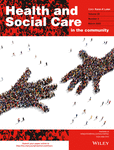Views on the use of the term ‘elder orphans’: A qualitative study
Abstract
Older adults living alone in the community with no immediate family network or support are referred in the literature as ‘elder orphans’. The grey literature has a growing emphasis on the importance of supporting this vulnerable group, particularly with health and social care. However, there is a dearth of empirical research on ‘elder orphans’, and definitions remained semantically complicated and unknown to the public, healthcare professionals and those being referred as elder orphans. This research explored the views of older adults on the use of the terminology ‘elder orphans’, and the implications of using the terminology in health and social care systems. A descriptive qualitative approach through face-to-face interviews of 11 older adults was undertaken in Auckland, New Zealand in October 2018. Narratives were analysed using thematic analysis. Two themes were identified from the analysis of interview data. The first theme was ‘realistic and practical term’, which emphasised the participants’ impression of the term ‘elder orphan’ resonating to themselves with great relevance to their current and future situations. The second theme is ‘visibility and vulnerability’, which highlighted participants’ both positive and ambivalent views on the use of the terminology in healthcare settings. The participants viewed this terminology as beneficial to alerting care services, and in promoting awareness among healthcare providers. Older adults from the study, who are living alone without immediate family networks and support self-identified themselves as ‘elder orphans’ through a gradual realisation of their current and anticipated social situations. The use of the term within healthcare was considered and preferred by the participants to be used contextually, and targeted towards appropriate health and social care services within and outside hospital-care settings.
CONFLICT OF INTEREST
The authors declare no conflict of interest.




